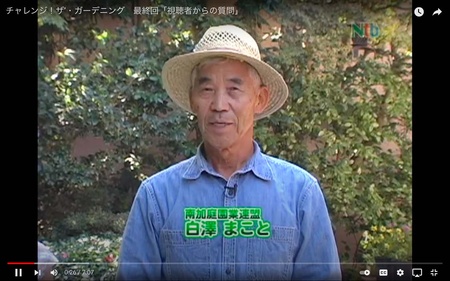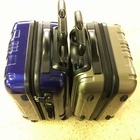The reason for going to America was to "see everything"
In the past, Makoto Shirasawa was actively involved in the activities of the Southern California Gardeners Association, whose headquarters are in downtown Los Angeles. He taught vegetable gardening classes organized by the association for seven years and wrote a column on vegetable growing in the Japanese newspaper, Nikkan Sun. He also appeared in the association's YouTube videos, providing information on vegetable gardening to the general public in Japanese.
However, before the pandemic, Shirasawa moved from the United States to Kagoshima Prefecture, Japan, where he currently lives. At first, I thought Shirasawa had "returned" to Japan, but I learned that he had simply "moved" to live with his partner, and that he planned to eventually return to the United States.
Shirazawa-san first traveled to the United States in 1963, nearly 60 years ago. He recalls that he was first surprised by the difference in civilization between Japan and the United States, which he read about in his fifth-grade social studies textbook. He was also influenced by Oda Makoto's travelogue "Nandemo Miteki Yaro," and wanted to see America with his own eyes, which was his reason for travelling to the United States.
"I went to America on a tourist visa at first, but six months was not nearly enough time to really experience America. So to extend my stay, I decided to go to university and switched to a student visa. Since I graduated from Tokyo University of Agriculture in Japan, I decided to major in horticulture at California Polytechnic University in the suburbs of Los Angeles. Then, while I was a student, I met someone I loved and married her."
Apparently, he was able to apply for permanent residency as his wife had permanent residency.
After graduating, Shirasawa got a job in the gardening and landscaping industry. However, he was not employed from the start and started his own business.
"I was not good at working in a group or interacting with others. So I decided to go independent and work in gardening and landscaping, which I love, when I was told I could work on my own and do what I wanted. I started from scratch with no connections, but I placed advertisements in local newspapers rather than Japanese ones and increased my clientele through word of mouth. I majored in horticulture in school, so it was my specialty, I could draw blueprints, and I had worked on American gardens rather than just Japanese gardens, so I think that worked well (in gaining customers). Also, I think I was partly riding on the reputation of my predecessors that Japanese landscape gardeners are very high quality and pay attention to even the smallest details (laughs)."
In this way, Shirasawa continued working actively until he was 75 years old.
"I'm still in good health, but I think the key to my health has been the fact that I've continued to work on-site for so long. Also, because of my personality, I can't leave the work site entirely to my employees, so I was always there at the workplace myself."
Improving the economic foundations of those returning to Japan
As mentioned above, Shirasawa married a woman he met at Pomona University, but lost his wife at a young age. At the time of his wife's death, his two daughters were still in junior high school and elementary school. Now, his daughters are grown up, married, and living in Colorado and California, but Shirasawa decided not to move to America, but to move to Japan to live with his partner.
"If I were to get sick, my daughters would be worried, spend time visiting me, and make sacrifices in their own lives. I wanted them to live their own lives, so I moved to Japan and am living with someone who shares the same views. Things are a world apart now; even though we are far apart, we can see each other every week on FaceTime, and if we want to meet, we can easily travel by plane. However, there still seems to be some resistance to the idea of cohabitation in Japan, so I think we will eventually return to the cemetery in California."
We asked Shirasawa, who has lived in America for over 50 years and is now living in Japan, about his thoughts on Japan and America.
First, about America, she said, "I was able to live freely in America. Perhaps it's because it's a country where immigrants with different ways of thinking have come together, so we can live without being too conscious of each other. Furthermore, individual freedom is guaranteed by the constitution, so this feeling is probably even stronger. I am Japanese both on the outside and inside, so there were times when I couldn't adapt to the values of other cultures, but I think we were able to accept each other."
He also says that compared to the United States, where he lived for many years, he feels the following inconveniences in Japan:
"First of all, it is inconvenient that the streets do not have names. You waste a lot of time looking for places, and even if you try to rely on the car navigation system, there is often no signal, making it very difficult to use. Credit cards are also a problem; some places take them and some don't, so you never know if they will be accepted. You have to carry a large amount of cash even when making slightly larger purchases. I once had the experience of leaving my cash at the clinic and not being allowed to leave even after my treatment was over. I asked them to send me the bill, but they refused. There were even times when I got worried I might not have enough cash on me while I was out shopping, so I turned back home."
Of course, there are also good things. "Although there are many disasters, the scenery in Japan is beautiful, and one of the joys is being able to eat Japanese food. Also, the people are kind."
When asked what preparations people planning to return to Japan from the United States should make, Shirasawa replied:
"I think it's important to be financially prepared. It's true that medical expenses for the elderly are cheap, but food and other costs seem expensive. I rent a field and grow a lot of vegetables. Not only does it provide food, but I feel that (growing vegetables) is very good for physical and mental health. Also, in terms of housing, before moving to Japan I sold my house in California and bought a condominium in Colorado, where my daughter lives, to earn rental income, and with the remaining half I used the money to buy a house in Japan."
He says that he has rental income in the United States and that by buying a house in Japan, he no longer needs to pay rent, which has allowed him to establish a foundation for life.
Finally, as advice to those who will soon retire, whether in Japan or the US, he added, "I recommend that you think ahead about how to fill the extra time you will have after you retire, whether in Japan or the US."
© 2022 Keiko Fukuda







